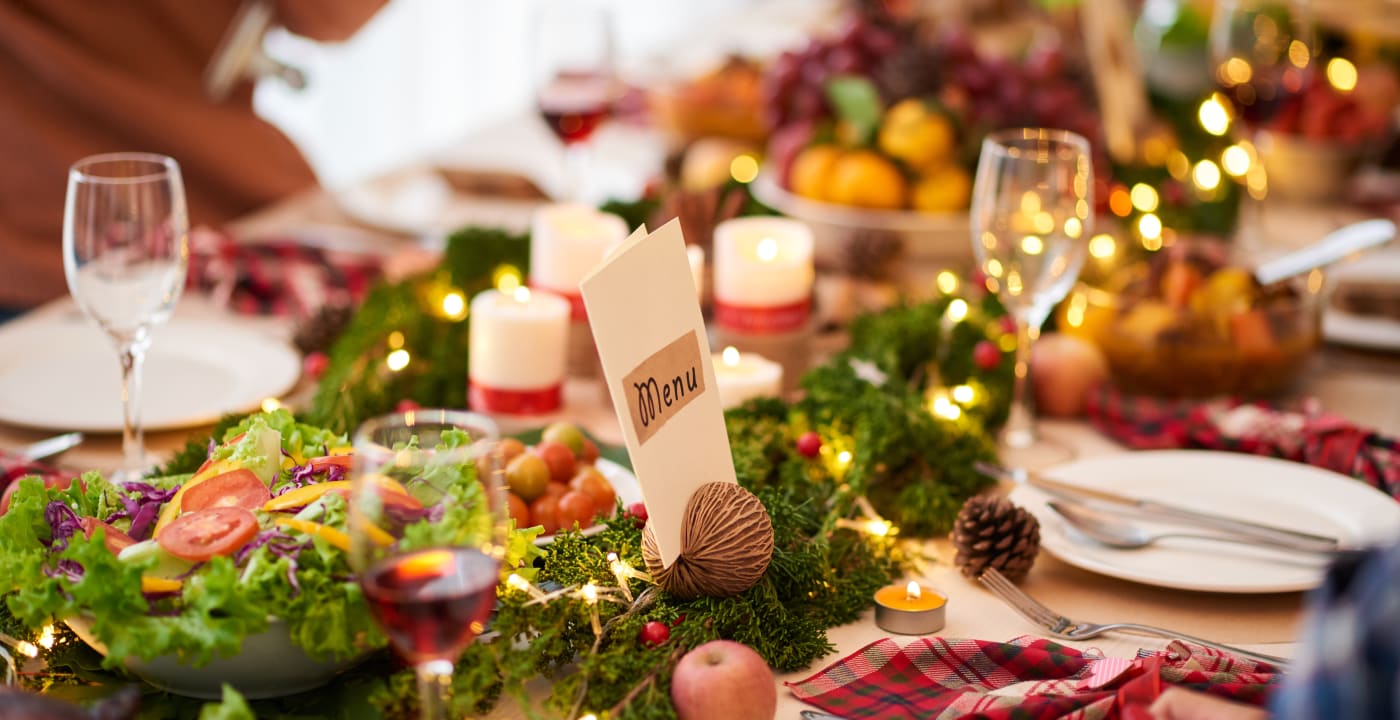How to gather safely this holiday season

Getting together for the holidays took on a whole new meaning in 2020 — virtual events like remote potlucks were the norm as we all sought creative ways to connect with loved ones near and far amid the shadow of COVID-19. Thanks to the widespread availability of vaccines in the U.S., that shadow is showing signs of lifting, inspiring many people to once again host and attend in-person celebrations this season.
However, COVID-19 is still among us and the choices we make not only affect our own health but the health and well-being of our friends, our family and our community. What steps can you take to ensure a joyous yet safe holiday gathering?
Step 1: Get vaccinated, get your booster
This year’s festivities coincide with the emergence of the omicron variant — yet another mutated form of the virus that causes COVID-19.
“Preliminary data seems to suggest that omicron is more contagious than delta,” says Mary Fairchok, MD, a pediatric infectious disease specialist at Mary Bridge Children’s. “Early signs also indicate that omicron can cause reinfections in those who have already been infected. Full immunization, including a booster shot, should still provide some protection against severe disease. Booster shots, in particular, provide broader and higher levels of immunity.”
Early reports out of South Africa, where the omicron variant was first detected, show increasing levels of COVID-19-related hospitalizations in children five and under. This trend indicates that the omicron variant may be affecting children in this age group more so than previous variants.
“Since children under five cannot yet receive a COVID-19 vaccine, it’s especially important for adults and older children in the family to get vaccinated,” says Dr. Fairchok. “This can significantly reduce the risk of infection for this vulnerable age group.”
In addition to getting vaccinated for COVID-19, it’s also a good idea to get the flu shot. “Flu is starting to spread in the U.S. and being simultaneously infected with both COVID and the flu can be hard on the immune system,” says Dr. Fairchok.
Step 2: Test, check for symptoms, mask up
Dr. Anthony Fauci, the top U.S. infectious disease expert, has endorsed in-person gatherings among those who are vaccinated, but what if your guest list includes a mix of vaccinated and unvaccinated people?
“I recommend avoiding indoor, in-person gatherings with unvaccinated people, but if that’s not possible, then those who are unvaccinated should get tested within 48 hours of a gathering — even if it’s only with an at-home antigen test,” says Dr. Fairchok.
At-home antigen tests are a screening tool that can be used to detect COVID-19, whether you have symptoms or not. These self-administered tests can be purchased online and at most pharmacies. While convenient, they are less sensitive than polymerase chain reaction (PCR) tests — the gold standard for diagnosing COVID-19 — and they can return false negatives.
In addition to getting tested, the Washington State Department of Health (DOH) recommends doing a health check with all guests before the event — ask if they’ve had any COVID-19 symptoms in the last two weeks and have them check temperatures before they arrive. Anyone with symptoms should not attend your gathering.
During your event, unvaccinated individuals should wear a mask and when they remove it to eat or drink, they should distance themselves from others.
Step 3: Consider your location
The safest gatherings are still outdoors, but if you must gather inside, choose a space that is as large as possible and has good ventilation (or air flow). A well-ventilated room can help reduce the amount of virus particles in the air. To increase air flow in your home, you can open windows and doors, set up fans, purchase a portable air cleaner and follow these ventilation tips from the Centers for Disease Control and Prevention (CDC).
“If guests cannot be well-spaced and the area is poorly ventilated, then it’s not a good idea to attend or host a gathering indoors, particularly if it’s going to include anyone at high risk for severe disease,” says Dr. Fairchok.
Step 4: Travel wisely
Many people have planned trips to meet up with family and friends for holiday celebrations this year. If you are travelling by plane, here’s what to know:
- If you are not fully vaccinated against COVID-19, the CDC advises against traveling.
- As of Dec. 6, all people flying internationally, regardless of vaccination status or nationality, must show a negative COVID-19 test taken no more than 1 day before heading to the U.S.
- Everyone two years of age and older, regardless of vaccination status, must wear a mask on airplanes, in airports and when taking public transit. Learn more about domestic and international travel requirements.
- Be aware of any health-related documentation that your particular airline may require.
Regardless of how you travel, it’s important to carefully monitor yourself for symptoms before and after your trip.
“I also encourage people to get tested after traveling, particularly if the trip includes close contact with people outside the household,” says Dr. Fairchok.
Step 5: If all else fails, gather virtually
If it doesn’t seem possible to safely gather in person or if you get sick at the last minute, you don’t have to abandon your holiday plans all together. Virtual meetups, while perhaps not ideal, do provide a way to socialize with the ones you love. The Washington State DOH has published a list of ideas for celebrating with friends and family on-screen, from coordinating secret gift exchanges to hosting game nights.



